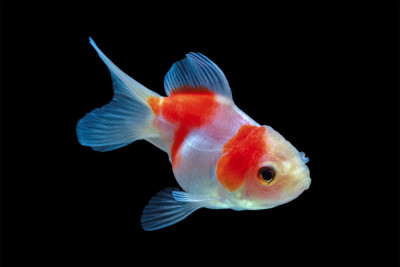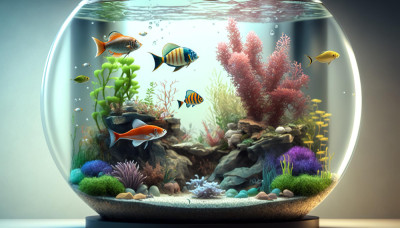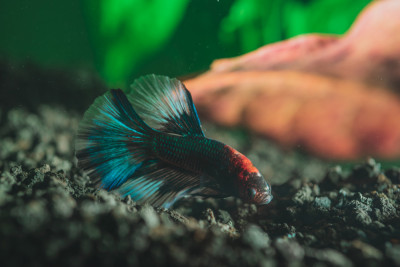-
Tank Size and Space
The first and most crucial factor to consider when choosing a pet fish is the size of the tank you can provide. Fish come in various sizes, and some species require more space than others. A larger tank generally provides a more stable environment for your fish, allowing them to thrive and live longer. Smaller tanks can lead to stress and health problems for your aquatic friends.
Before acquiring a fish, research the specific requirements of the species you're interested in, including the recommended tank size and any special equipment needed, such as heaters or filters. Ensure you have enough space in your home for the chosen tank size and that you can commit to maintaining it.
-
Water Parameters
Each fish species has its own preferred water conditions, including temperature, pH level, and hardness. It's crucial to match these parameters to the needs of your chosen fish to ensure their well-being. Investing in a water testing kit can help you monitor and maintain the water quality in your aquarium.
Common parameters to consider include:
- Temperature: Tropical fish typically require a water temperature between 75°F and 82°F, while coldwater fish thrive in cooler temperatures.
- pH Level: Different fish prefer varying pH levels, ranging from acidic (pH below 7) to alkaline (pH above 7).
- Water Hardness: Some fish prefer soft water, while others thrive in hard water conditions.
Matching your fish's requirements to your local water conditions or being prepared to adjust them is essential for their health.
-
Compatibility
Fish come in countless species and varieties, each with its own temperament and social behaviors. To ensure harmony in your aquarium, research the compatibility of different fish species before making your selection. Some species are known to be more aggressive and territorial, while others are peaceful and can coexist with various tankmates.
It's crucial to consider the social dynamics of the fish you plan to keep and ensure they are compatible in terms of size, temperament, and dietary preferences. Some fish thrive in a community tank with various species, while others are best kept in species-only setups.
-
Diet and Feeding
Understanding the dietary needs of your chosen fish is essential for their overall health and longevity. Different fish species have varied diets, including herbivores, carnivores, and omnivores. Research the specific nutritional requirements of your fish and provide them with a balanced diet.
In addition to dry flake or pellet food, consider offering live or frozen foods to provide a diverse and natural diet. Overfeeding is a common issue in fishkeeping, leading to water quality problems and health issues. Follow feeding guidelines carefully and monitor your fish's behavior and appearance to ensure they are getting the right amount of food.
-
Lifespan and Commitment
Fish can live for varying lengths of time depending on their species. Some fish may only live for a few years, while others can thrive for decades. It's essential to consider the potential lifespan of your chosen fish and the commitment required for their care.
If you're looking for a long-term pet, research species that have longer lifespans and be prepared for the commitment involved. Fishkeeping is not a short-term hobby, and proper care can lead to a rewarding and enduring relationship with your aquatic companions.
-
Maintenance and Cleaning
Maintaining a healthy aquarium requires regular cleaning and maintenance. You'll need to perform tasks such as water changes, filter cleaning, and glass cleaning to keep your tank environment stable and aesthetically pleasing. Consider whether you have the time and dedication to carry out these tasks on a regular basis.
-
Research and Education
Before bringing any fish into your home, it's crucial to educate yourself about the specific needs and care requirements of the species you're interested in. Research online, consult with experienced aquarists, and read books or articles about fishkeeping.
Additionally, consider joining online forums or local fishkeeping clubs to connect with fellow enthusiasts who can offer valuable advice and support. Continuous learning and staying informed about best practices in fishkeeping will help you provide the best possible care for your new pet fish.
-
Sustainability and Ethical Considerations
Finally, it's essential to consider the ethical and sustainability aspects of fishkeeping. Some fish species are collected from the wild, which can have a detrimental impact on natural ecosystems. To promote ethical fishkeeping, consider purchasing fish that are captive-bred or sustainably sourced.
Conclusion
Choosing the perfect fish as your new pet requires careful consideration of factors such as tank size, water parameters, compatibility, diet, commitment, maintenance, research, and sustainability. By taking the time to evaluate these aspects, you can create a thriving and harmonious aquatic environment for your fish while enjoying the many benefits of fishkeeping. Whether you opt for a vibrant tropical community or a serene coldwater setup, the right choice of fish can bring beauty and tranquility to your home for years to come.







